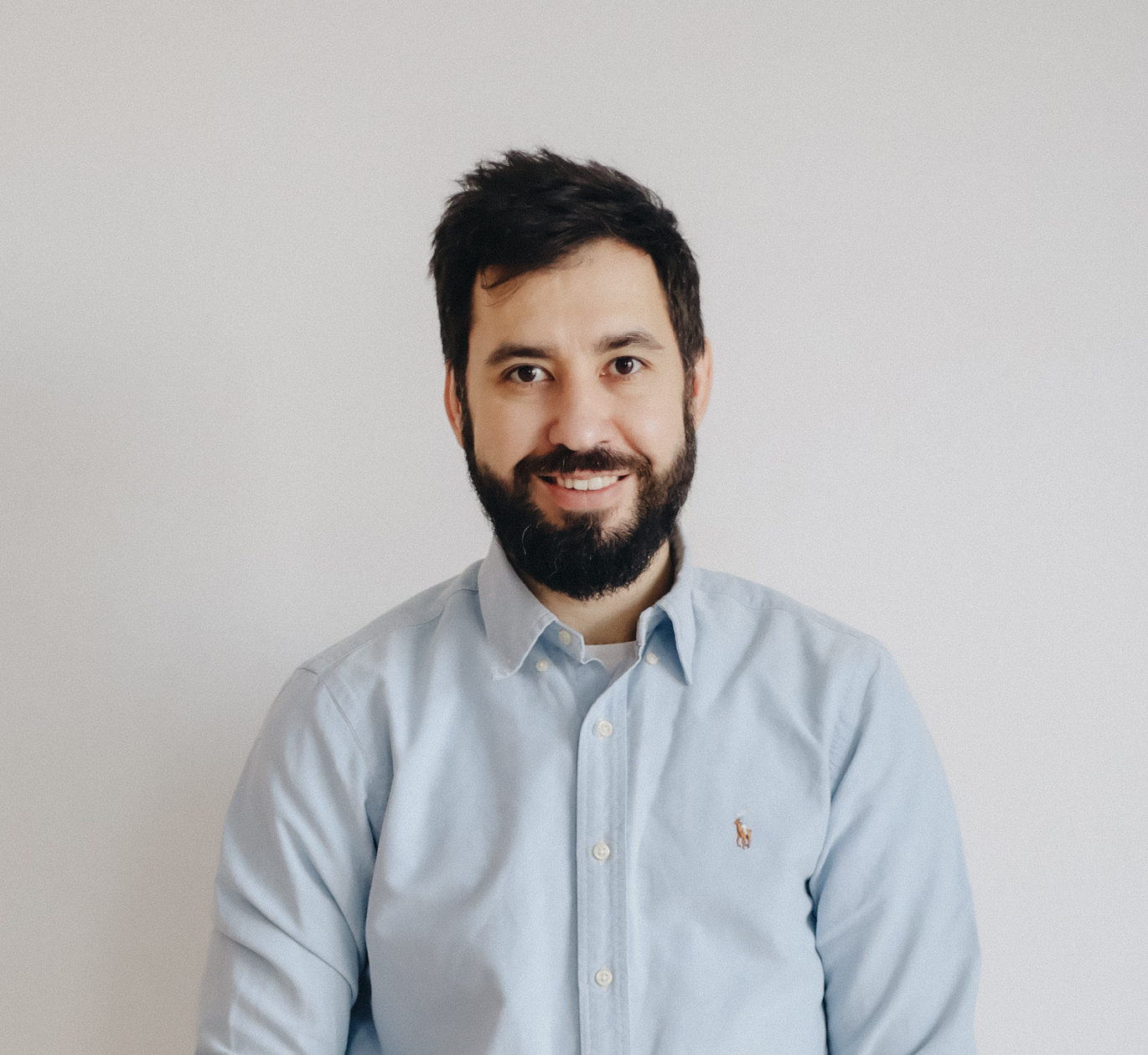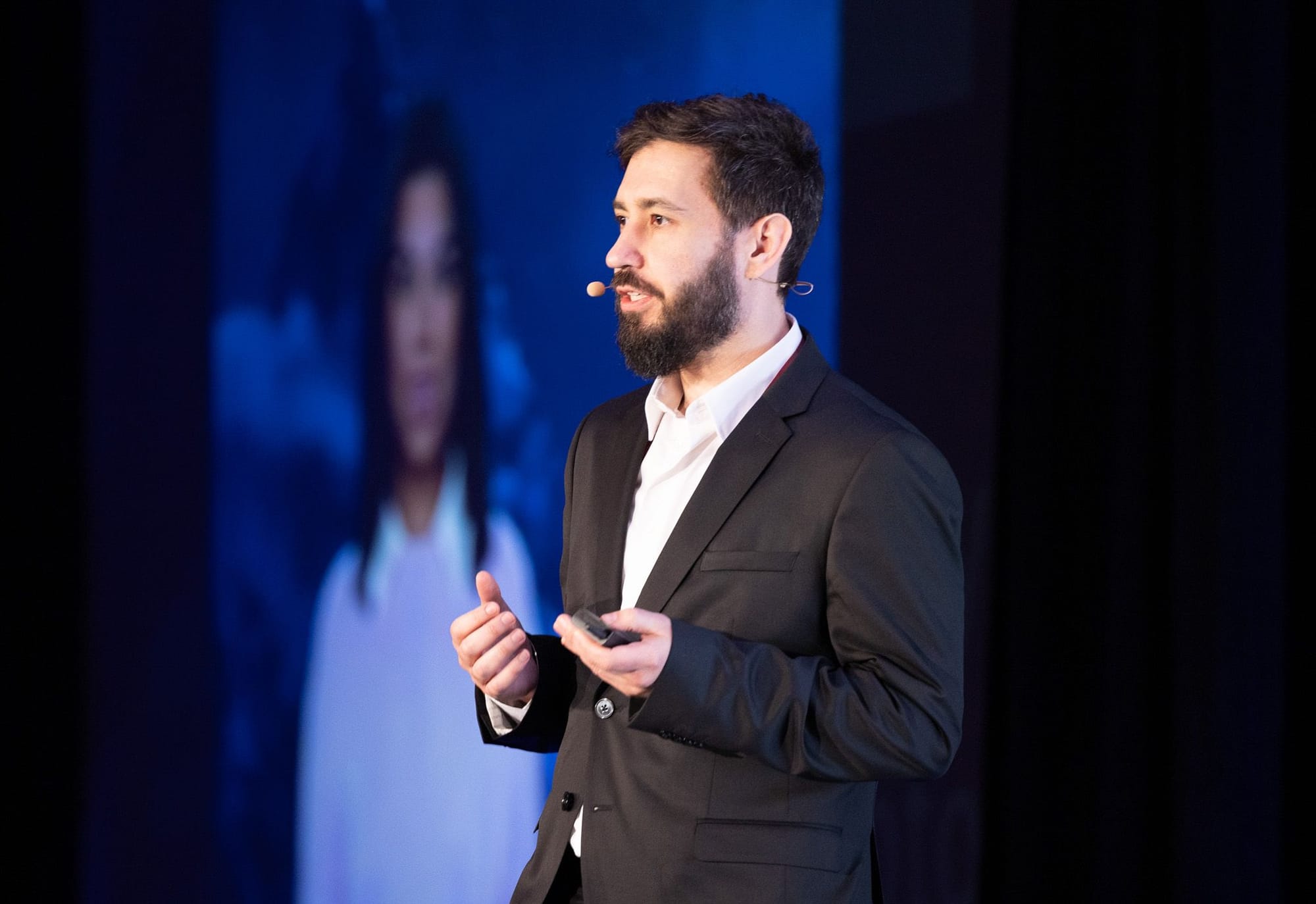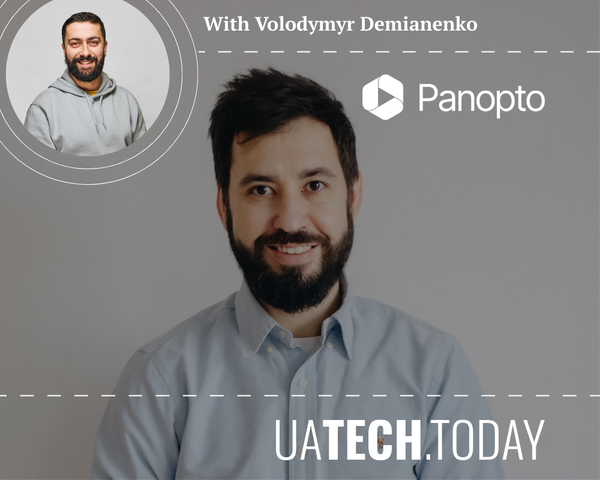What does it really take to turn an idea into a fast-growing startup—and navigate a successful exit?
For Vitalii Romanchenko, it began with a curious mindset, deep tech experience, and the decision to focus sharply on one niche.
As the founder of Elai.io, an AI-powered video generation platform, Vitalii led the company from launch to acquisition by industry leader Panopto in just over three years. Today, he continues the journey as Head of AI Product Strategy at Panopto, helping shape the future of video and education through artificial intelligence.
In this exclusive conversation with UAtech’s founder, Volodymyr Demianenko, Vitalii opens up about building in a competitive market, the realities of M&A, and what every founder should know about timing, strategy, and staying focused on what actually works.

Volodymyr Demianenko: Could you share your professional journey before launching Elai.io?
Vitalii Romanchenko: So, basically, my main background is in software development, mainly in the product management and engineering roles. Before launching Elai around three years ago, I spent over 10 years in enterprise software development. I worked on products for major brands like Warner Bros., Dolce & Gabbana, and others.
Volodymyr Demianenko: Was Elai your first startup?
Vitalii Romanchenko: It was my first serious one. I had earlier projects—like a mobile app in 2015 and an e-commerce venture with my co-founder Alex—but Elai was the first that really made an impact.
Volodymyr Demianenko: What inspired you to start something of your own?
Vitalii Romanchenko: I’ve always considered myself a naturally curious person. I'm interested in many different things.
One quote that really stuck with me comes from basketball player Russell Westbrook—his motto is “Why not?” That mindset resonates with me. Why not try something new? Why not build something from scratch?
That’s what pushed me to start Elai. I had already worked on several projects and been deeply involved in product development, so creating a company felt like the natural next step. But launching a venture-backed tech startup is very different from starting a traditional business. In this world, you’re expected to aim high from day one—essentially to build a unicorn. And the odds are stacked against you: about 95% of these startups fail.
To succeed, you need to be extraordinary right from the start. That means having a strong market insight or a unique innovation that makes you 10x better than the competition. That’s incredibly challenging—it requires deep thinking, a clear vision, insights, and relentless execution. You’re building something from zero to one, and that’s a different kind of game.
Volodymyr Demianenko: Were there any moments of self-doubt when you started? And how did you work through them? We'd love to hear more about your personal experience—maybe advice you’d give to others starting their journey.
Vitalii Romanchenko: Absolutely. Building a startup is hard. We weren’t just building a business; we were developing new technology from scratch. That added an extra layer of complexity.
My biggest piece of advice? Be determined. Execute fast. Be willing to adapt and change. Execution is everything. You’ll face challenges every single day, but you have to keep delivering. That said, even if you’re fully committed, if your timing is off or you don’t have a strong insight, success will be much harder to achieve. So it really comes down to a combination of insight, timing, and relentless execution.
Volodymyr Demianenko: So your main advice would be: know the industry, and start doing something?
Vitalii Romanchenko: Exactly. Build your knowledge, understand your space, and take action.
Volodymyr Demianenko: How long was Elai independent before the acquisition?
Vitalii Romanchenko: We registered the company in early 2022, so it was about t and a half years from that point until the acquisition.
Volodymyr Demianenko: What were the key factors behind your decision to sell Elai?
Vitalii Romanchenko: Every startup should have an exit strategy. In most successful cases, it’s through M&A rather than IPO. You need to assess market conditions and opportunities. If a good offer comes, you seriously consider it.
Volodymyr Demianenko: Was the decision influenced by the growing competition in the avatar AI space?
Vitalii Romanchenko: I'd say the competition in this space increases every year, simply because more companies are entering the market. So, I wouldn't say last year was any tougher than it is now—you still face strong competitors. What matters is your strategy and how well you differentiate your product. Even today, an avatar company can succeed if it has a solid approach. For example, Synthesia—one of our main competitors—recently hit $100 million in annual recurring revenue, showing that the market is strong and full of potential. In our case, the decision to sell wasn't solely due to competition. I believe our technology was among the best, and we were fully capable of competing. But ultimately, it came down to a combination of factors. One key reason was that we were a great strategic fit for Panopto, especially given their focus on building AI for the video industry.
Volodymyr Demianenko: Why did Panopto feel like the right acquirer?
Vitalii Romanchenko: First, it's not always about what you think—it’s about what they see in you. It’s a competitive process.
Less than 5% of start-ups get acquired. If one company is talking to you, chances are they're also in conversations with dozens of other startups that offer similar value.
So it’s never a one-sided decision—it’s a mutual fit that has to make sense for both sides. In our case, there was a strong cultural fit, and their mission aligned with ours. They’re big in higher education, and that matched our focus on learning and development. We had engaged in M&A conversations with other companies before, but Panopto’s use case aligned most closely with what we were building. That’s why they were interested—and why the acquisition made sense.
Volodymyr Demianenko: Could you share more about Panopto’s business and its position in the industry?
Vitalii Romanchenko: Panopto is a global leader in AI-powered video management systems, with a strong presence in the education sector, especially in higher education. While they also serve corporate clients, their primary focus is academic institutions. They work with top universities—22 of the 25 biggest ones use them.
Volodymyr Demianenko: When Elai was acquired, was it just you who joined Panopto, or did your entire team come along? I think many people are curious—how does an M&A actually work in real life?
Vitalii Romanchenko: It really depends on the situation—every acquisition can look different.
But in general, if you're a startup, you should be thinking ahead and preparing to potentially be acquired.
That means positioning yourself in a way that would be attractive to potential buyers.
There are two main approaches: you can actively seek acquisition opportunities, or you can simply build something valuable and let interest come to you. In our case, we had ongoing conversations with various investors and strategic partners over time. Eventually, we were approached by K1, a private equity firm that owns Panopto, and that’s how our M&A discussions began.
We weren’t actively trying to sell the company—we always aimed to grow Elai into a successful business. But as relationships developed and conversations progressed, we started to see that the fit with Panopto made a lot of sense. So, we decided to explore it seriously.
Volodymyr: And how did the acquisition go for your team?
Vitalii: The entire Elai team was acquired. We were integrated into Panopto’s departments—marketing, dev, etc. We’re no longer a separate unit, but the product still exists under the Panopto umbrella as Elai powered by Panopto.

Volodymyr Demianenko: What changes, if any, have happened in your role since the acquisition?
Vitalii Romanchenko: Right now, I serve as the Head of AI Product Strategy at Panopto.
My current role is focused on leading initiatives that help scale the business through AI. I support current AI operations and also assist the sales team. Overall, my goal is to help Panopto grow by integrating AI more deeply into its day-to-day operations. Before the acquisition, I was in a broader leadership role as the CEO of Elai, overseeing both the business and strategic direction. Now, my focus is more specialized, centered around AI innovation and execution within a larger organization.
Volodymyr: As a founder, how did you feel about the acquisition? Were you happy, like “Great, we did it!” or was there also some sadness because it was your creation? Or maybe both?
Vitalii Romanchenko: Honestly, it was a mix of emotions. On one hand, there’s happiness—seeing your company reach that kind of milestone is a big achievement. On the other hand, there's also a bit of sadness, because as a founder, you're deeply attached to the product you've built. So yes, it was definitely both.
But ultimately, as a founder, your goal is to make the business successful. That’s a long-term mission. Along the way, you have to stay aware of market conditions, competition, and the broader landscape. A common mistake is thinking, “I’ll build a unicorn just because I’m smart.” In reality, it’s like a strategic game—and your competitors are playing it too.
Starting a company is a lot like surfing—you have to spot the wave early, while it’s still forming on the horizon. That’s when you make your move. If you wait until the wave is right in front of you and already crashing, it’s too late—you’ve missed the opportunity. That’s why timing and foresight are so important.
In our case, we made the decision to sell because it was the right move for the company and for us at that time. Personally, I see myself as a lifelong learner, and this M&A experience has taught me a lot. It was challenging and complex, but also incredibly valuable. Now, I’m learning about enterprise sales and how to scale a larger organization—skills that will help me in the next stages of my journey.
Volodymyr Demianenko: One more question about the M&A—when Panopto made the offer, was it a condition of the deal that you and your team had to stay on with the company? Or was that optional?
Vitalii Romanchenko: It really depends on the structure of the deal. In some cases, a company might acquire only the intellectual property (IP) and not retain the team—they're just buying the technology. But in our case, Panopto wanted both: the IP and the team. Having us on board was a critical part of the deal, especially for a smooth transition.
Also, the product wasn’t shut down; it still exists. So again, it all comes down to what the buyer is looking for. If they're just after the tech, it could be a simple cash deal, and the original team might move on. But when there's a functioning product with a support structure, sales process, and in-house expertise, companies typically want to keep the team to preserve that value.
Volodymyr: So in your case, it was essential for both you and your team to stay?
Vitalii: Yes, that was an important part of the agreement.
The key thing to remember is that you shouldn’t just think about the deal from your perspective. You need to look at it from the buyer’s point of view. For Panopto, acquiring an AI company like ours wasn’t just about the product—it was about strengthening their overall capabilities and boosting their value. Understanding what the buyer needs helps you position your company strategically and build a deal that works for both sides.

Volodymyr Demianenko:. Since you’ve now exited a company, you might be investing in startups. When you evaluate new founders, what’s most important to you as an investor?
Vitalii Romanchenko: Great question. For me, it’s primarily about two things: insight and execution. Does the team have a unique understanding of the market? Do they see something others don’t?
The second piece is: can they execute? A team might have great insight, but if they don’t know how to enter the market or don’t have the skills to analyze and adapt, they’ll struggle. I also pay close attention to their go-to-market strategy. Ultimately, you need a product that’s 10x better than your competitors—and a team that knows how to bring it to market effectively.
Volodymyr Demianenko: You have already mentioned the importance of having "insight" several times. What do you mean by that? Do you mean that the founder has to have worked in that field for, say, 10 years? Or does it mean something else?
Vitalii Romanchenko: It doesn’t necessarily mean you need 10 years of experience in the field. What matters is whether you can recognize a strong opportunity—something that can lead to extraordinary results.
Let me give you some examples. If you're in bioscience and you discover a drug that cures a disease, and it’s the only one of its kind on the market, that’s a huge insight. You’ll likely gain a large market share because you saw something others didn’t.
Or take accounting. If you’ve worked in accounting for 20 years, you understand the pain points, you’ve lived them. So if you build a product tailored to accountants, you know how to talk to that audience and how to sell it. That’s a different kind of insight—but just as valuable.
In some cases, you don’t even need a totally original idea. For example, let’s say you’re from Southeast Asia and you see a technology that’s working well in the U.S. or Europe. You decide to adapt it for your local market. That’s perfectly valid. If you execute well, you could become the top company in that region and build a billion-dollar business. It’s geographic differentiation, but it still requires a deep understanding of the local market and a strong go-to-market strategy.
Volodymyr: From the investor's perspective, do you think it’s important for a founder to be a second- or third-time entrepreneur? Or is it okay if they’re a first-time founder?
Vitalii: Having a successful track record definitely helps. Investors are putting in a lot of money, and if they don’t know you personally, they need something to go on. Trust matters. If you've had a successful exit, it gives you credibility.
That said, being a first-time founder isn’t a dealbreaker, but you’ll need to work harder to prove yourself. You have to build relationships and show evidence of your capability.
There’s a great story about Jensen Huang, the founder of Nvidia. When he pitched his idea, his boss at the time said, “I didn’t understand a word of your presentation. But I know who you are—you’re the hardest-working person out of 2,000 employees.” Then he picked up the phone and called an investor and said, “You should give this guy money.” That’s the power of a strong reputation and work ethic. People believed in him, not necessarily because they understood the product, but because they trusted him.
So at the end of the day, whether you’re a first-time or repeat founder, the most important thing is building trust and showing that you can deliver.
Volodymyr Demianenko: Another question about Elai. You’ve emphasized the importance of uniqueness and that it played a role in your acquisition. What specifically differentiated your company from others?
Vitalii Romanchenko: Sure. We weren’t completely unique in the sense of being the only player in the market. We operated in the AI avatar space, which had quite a few competitors. But what made us stand out was our strategy—we chose to focus on a very specific niche: learning and development, especially in the context of training videos.
Instead of trying to be everything to everyone, we tailored our features specifically for that segment. Other companies had good products, but we offered something better suited to this particular use case. That specialization made a big difference and positioned us well for acquisition by a company with a strong presence in education, like Panopto.
In terms of performance, we weren’t the biggest player in the market, but we had built solid traction over time. Throughout Elai's journey, we reached over 10,000 paying customers across different segments—from individual creators and small businesses to larger enterprises. Not all of them were active at the time of acquisition, but that volume helped us establish strong brand recognition. Our pricing started as low as $29 per month, which helped us build a broad customer base.
We were consistently ranked among the top 3 to 5 AI video generation platforms in the education space. We had a recognized brand and were frequently mentioned in industry discussions. That visibility and strong positioning helped us gain attention from potential acquirers.
Volodymyr Demianenko: Your marketing approach seemed to lean a bit toward B2C, especially targeting small businesses. If I remember correctly, you had some strong marketing talent—possibly even a CEO-level contributor—who helped you grow quickly. What were the key elements of your marketing strategy? What worked for Elai?
Vitalii Romanchenko: Great question. When it comes to go-to-market strategy, it’s less about having a “perfect” plan and more about figuring out what actually works—and then doubling down on that.
For us, inbound marketing was where we found the most success. We managed to build a strong funnel that brought in a steady stream of leads and customers organically. On the other hand, B2B outbound sales, especially for enterprise clients, were much more challenging. We had some wins there, but it was harder to scale and far more resource-intensive compared to inbound.
If you’re wondering whether we could’ve done things differently, absolutely. But a lot depends on where your strengths lie. For example, if you're good at paid ads, then lean into that. Build your unit economics around it and scale that channel. But if you don’t have experience with B2B content marketing or social media, don’t spread yourself thin trying to master everything at once.
As a startup, your resources are limited, so focus is everything. You have to be disciplined about doing more of what works—and deliberately avoid what doesn’t. That’s one of the most important lessons we learned.
One of the best frameworks I know is:
Single customer, single product, single channel.
Master one of each, and once that’s working, you can scale from there.
Volodymyr: That sounds like a quote—“Single, single, single!”
Vitalii: It’s not mine originally—I heard it somewhere—but it really stuck with me.
Volodymyr Demianenko: That was great. Is there anything else you'd like to share—something we didn’t ask about Elai or the M&A experience that you think is important?
Vitalii Romanchenko: I think the biggest message I’d leave people with is: just try. If you’re thinking about starting something, why not? Try it. Learn about the niche or the problem you care about. Dive into it. You don’t need to be a genius or have some rare talent—what matters is taking the first step and starting to build.
Once you begin, you’ll start seeing small results. Those early results will give you the momentum and confidence to create something bigger. So don’t overthink it—just start. That’s really the most important thing.



